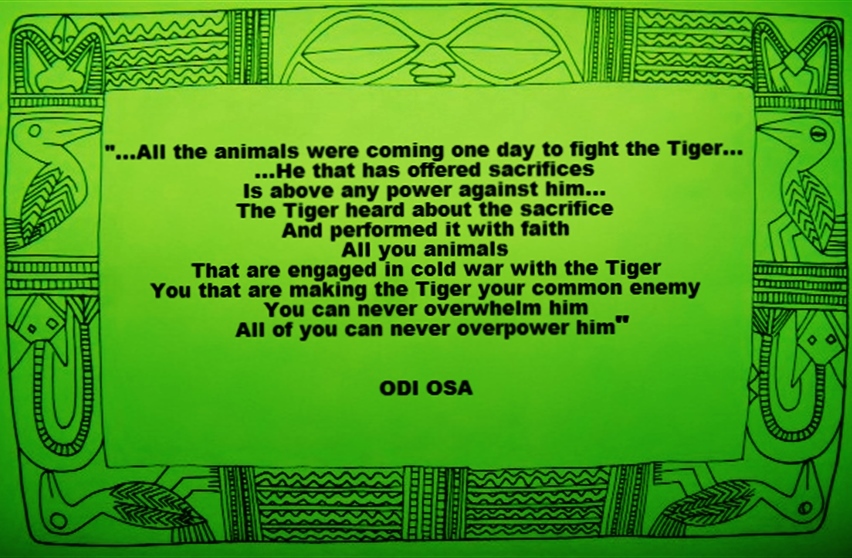
When one speaks of the Yoruba people, culture and their traditions, it is impossible to separate the subject from Odu Ifa. Within the oral corpus of the Ifa divination and worship system resides the soul and beating heart of the Yoruba people as a whole. The 256 odu signatures of Ifa and the thousands of ese/verses they contain, comprise all of the science, cosmology, metaphysics, medicine and wisdom held within that sacred ground. Ifa embodies the wisdom of life, truth, the revealing of destiny and destination. Ifa is the living body of wisdom handed down by Olodumare, given to Orunmila, the first diviner priest and the only one who is witness to our destiny in the spiritual realm when we are ready to be born. He used this wisdom to heal and resolve all human problems that come with living on this earth as well as training the diviner priests who came to be known as “Babalawo”, priest of Ifa who are teachers and know the secrets contained within the 256 odu, and how to use that knowledge to help us attain our perfect destiny. The odus are the wombs which each one of us come from, with our own unique road or path that constitute all of the possibilities inherent in one’s life destiny-positive and negative. The odus and their verses are road maps that can guide one in detail through life towards the things that all living beings cherish: long life, health, family, children, love, money, position in life, freedom from loss, victory over sickness and death. But who is the savior priest who brought IFA to the people?
The first Babalawo priest who walked the earth was named Orunmila. It is he who encompassed and encompasses the entire order of the Yoruba cosmology, as he IS deity, prayed to and the prayer. Orunmila is the custodian of the wisdom of IFA, along with Esu, the Sacred Child of Heaven, Lagemo Orun. Without Esu, none of the divination or sacrifices could be completed with success. Orunmila is the only person among the descendants of God who can give prophesies of the future, the present and can change the future outcome of situations in order to bring us more perfection, power, success and happiness. It is through the eyes of Esu that Orunmila can see into the past, present and the future. It is Orunmila that people turn to when confronted with the need to assess how to overcome a problem and/or which life purpose is their destiny and how to achieve that destiny wholly. He passed down to his learner Babalawo, the priests, the entire knowledge held within all 256 odus; the paths and life destinies to be played out here on earth by all humans, but it is only Orunmila who knew all of the verses in their entirety. Within each odu there are hundreds of ese, verses or poems, that describe in detail a particular client who approached an Ifa priest because of something troubling them in this life. The client could be a woman desperately wanting a child, it could be a cat needing to rid himself of creditors who will not let him sleep, it could be a common vine wanting to rise above the rest of the forest and claim her place in the sun, all of them with problems similar to what befalls man and it is in parables that Ifa speaks, much like the words of Jesus. The negative forces of life, called the Ajogun, are what bedevils all of us at one time or the other. These are : loss, sickness of pocket (money trouble), sickness of body, lawsuit, obstacles of every sort imaginable, impending death etc.
‘Òwe ni Ifá ípa, òmòràn ni ìmò ó’
Ifá always speaks in parables;
It is a wise man who understands his words.
Contained within the verses is the key, the answer and remedy to the clients particular problem, and it is the task of the Ifa priest to prescribe the sacrifices, call upon the orisa deities and other heavenly forces, make the sacrifices and once again bring about harmony in the client’s life. Over time, these verses have slowly faded from memory, a few here, a few there, lost over the centuries as inter-tribal warfare, slavery, colonization and jihad encroached upon Yorubaland. It has been solely through the oral tradition of memorization that the odus and their myriad verses have been preserved. It is only now in the 20th and 21st centuries that academics and priests have taken to the task of writing these verses down to preserve them, to share the tradition, and to ensure that future generations will have recourse to the knowledge of their forefathers and foremothers.
A junior priest must be able to recite a minimum of 4 verses for each odu to be qualified to become a full fledged Babalawo. Initiation into Ifa does not make one a Babalawo priest or diviner. It is only after mastering not only the verse, but all of the prescribed sacrifices, the chants and orikis, the plant medicine and accompanying songs, that a junior initiate can then take his place as an embodiment of Orunmila in society. There are at least 40 ese for each odu and upwards of 800 cited as possible, with many more lost to time.As of today, many Ifa priests still travel from town to town to learn new Odu Ifa from a competent Ifa priest. Some Ifa priests might even stay for some years as a student in order to learn more and before going back to their home to continue the gospel of Orunmila. It is very common to study with a learned priest, whether it is an Onisegun, to learn more of ewe oogun (the practice and manipulation of destiny with plant medicine), or an elder whose memory and experience far surpasses any of his juniors in the Ifa priesthood.
All the descendants of God, and this includes the orisa in the beginning, called upon the great diviner Orunmila to give advice on how they could be successful at their various endeavors here on earth. The orisa, just as all of us, wanted to find solutions for their problems, to achieve their highest glory and honor here on earth, to know the outcome of voyages, business propositions, where to settle so that they could lead productive and happy lives. Many of the problems faced by the orisa, the first diviners and their companions, were problems that were spiritually rooted, from ignorance, the breaking of dietary taboos and deviating from accepted customs.
The Ifa priests took their origin from Orunmila and other great and wise diviners from generation to generation, before the emergence of the reforming prophet of the Oduduwa era of Yoruba history (500 BC-500 AD). To this present day the divinatory process of Orunmila, the principles and procedures have yet to change, although some verses have been lost as stated earlier. The ancient people believed that heavy power should not be left within the hands of one person only, that it should be spread among the people of a community to provide checks and balances. This was done so that one person would not become so powerful as to dominate others.
The Story of ODU IFA
One of the first diviners is/was called ODU, and Odu is female. She is the second wife of Orunmila. Orunmila married Odu when the first wife of Orunmila, called EGAN, could not get pregnant. Orunmila consulted the Ifa oracle about his wife’s barrenness. Ifa told him to go and marry a second wife before Egan could bear a child. According to the Odu Ifa of Iwori Rete:
Aja oni bode Mowa
Dog is a watch guard of Mowa town
Agbo onibode Moba
Ram is a watch guard of Moba town
Adiye Irana Aba ara sukusuku
The fowl that roams about always look strange
Adifafun Orunmila baba mani egan sile
Thus declared Ifa oracle, and advised Orunmila that Egan his wife, was without a child
O lo re gbe Odu ni iyawo
Then, he decided to take Odu as his second wife
Egan a so, Odu awo, omo awo a male (how Ifa priests greet Babalawo’s wives)
Egan will produce seed, Odu will continue multiplying, and Ifa students will increase.
This was how Odu gave birth to the 16 children of Odu Ifa after Orunmila married Odu as a second wife.
From the verse called Ofu-Meji, it was made known to every Babalawo that Odu the diviner is the one who gave birth to all the first 16 children of Orunmila.
Oloko lo mo bi isu tasi
It is the farmer that knows where yam has germinated
Ko to ma di oyi kale biri biri biri
Before it started to spread over the land
Adifafun Orunmila baba lore gbe Odu ni iyawo
Thus declared Ifa oracle to Orunmila after he took Odu as his wife
Won ni o kara giri, ebo ni omo kose
He was asked to hold himself, and after the sacrifice for his wife to get pregnant
E wa wo omo Odu bere
Come and see the children Odu has spread everywhere
Odu lo biwa, Odu lo yawa
Odu is the one that gave birth to us, Odu is the one that produced us
E wa woo mo Odu bere
Come and see the children Odu has spread over the land
Odu lo bi wa ba se po ba won
Odu is the one that gave birth to us
All Babalawo should always see each other and love one another as they love themselves. In order to embrace, love and have compassion for one another, the senior Babalawo always says to others:
Ati elegan, ati olodu ni won jo se awo (words of shared love among all Babalawo).
Ifa priests and Iyanifa initiated without seeing Odu and Ifa priests initiated seeing Odu, can both participate in any Ifa services (women cannot gaze upon the Odu calabash though women ARE innately, ODU). That is, we are all children from Orunmila, because Egan and Odu were wives to Orunmila.
ODU then gave birth to sixteen children called ODU IFA. The first ranking among them is:
EJI-OGBE
OYEKU MEJI
IWORI MEJI
ODI MEJI
IROSUN MEJI
OWONRIN MEJI
OBARA MEJI
OKANRAN MEJI
OGUNDA MEJI
OSA MEJI
IKA MEJI
OTURUPON MEJI
OTURA MEJI,
IRETE MEJI,
OSE MEJI
and the last rank among them is OFU MEJI,
the eldest son among the ODU IFA, but EJIOGBE was the one crowned as king among them in spite of his being the youngest among them, according to verses of Ejiogbe as follows:
Oloto, Orororo, Ototo laje epa, ototo leje omu,
ohun to ri,
ntori ohun tori nitori,
ohun toritori ni won fi fun oba maki ni ode ikanje,
kole bafi oun toritori tani lore,
adifafun Erinjinlogun odu,
won lo ba olufe tun aye so bi igba.
Adifafun Ejiogbe o loba olufe tun aye o so bi igba.
Ayi mo iwa fun ara won ni,
ara isewaju wa di ara ikeyin,
eni mo fun ara won ni
Meaning: After some time when Orunmila had left Earth to go to heaven, the king of Ife land now summoned Orunmila to come back to Earth to help him to resolve some problems within the community. Orunmila said he could not come back to Earth again, so he then sent his sixteen children called ODU IFA, as they were well trained and had full knowledge of Ifa to help the King of Ife solve his problems. Orunmila immediately told them of their impending journey to Earth. The team, led by Ofu Meji excluded little Eji-Ogbe from embarking on the journey with them, but Eji-Ogbe is the one that went to consult Ifa about the journey. Ifa now advised him to not overlook anyone, especially those seeking his assistance. Ofu Meji lead the team and after a few days journey they met the son of the King of the Forest who informed them that his father was requesting their assistance in solving his own problem before they went to see the King of Ife. Ofu Meji rejected the request and replied to the boy that when they were through with the King of Ife, he and his team would come back to assist him. He then asked the boy the road that would take them to Ife. The boy gave them the wrong direction and the team set out. In the meantime, Eji-Ogbe had set out on the journey, tagging a few days behind the team of Odu. He met the boy on his way and the boy once again requested assistance on behalf of his father the King. Eji-Ogbe quickly set off to assist the King of the Forest. When he had divined and resolved the King’s troubles, he asked the boy to set him straight on the road to Ife. Ejiogbe reached Ifa at just the right time, divined for the King and made all of the necessary sacrifices to bring about a grand resolution. The King of Ife was happy with the work. He then honored Eji-Ogbe and crowned him as King before the others arrived. The others soon heard the news on the road that Eji-Ogbe had reached Ife before them, and he had been crowned as leader of all the Odu Ifa. The others from Oyeku Meji to Ose Meji then spoke among themselves and praised Eji-Ogbe on his great achievement, but Ofu Meji was ashamed and he was the last Odu Ifa to praisee him. The others blamed and chastised Ofu Meji because of his pride and rudeness, and he retreated into the forest where he spent some days, without ever reaching Ife Land on time.
Because Ofu Meji is the eldest, they still respect his word’s message when decisions arise. The Ifa priests shout HEE PAA! whenever he appears, while they shout SAAKII! when Eji-Ogbe appears because of his supremacy.
© 2016 by Farin da Silva, All Rights Reserved. Pursuant to the Copyright Act of 1976 and subsequent amendments, codified as 17 U.S.C. §§ 101-810, the works contained within are protected by United States laws and by international treaties. This includes the literary and pictorial works created by Farin da Silva contained herein, as well as any other original works of authorship fixed in any tangible medium of expression. The unauthorized copying, distributing, displaying, or production of derivative works is strictly prohibited by Farin da Silva. Copyright infringement may subject you to civil liability of a minimum of $750 per infringement for statutory damages, as well as the costs incurred to enforce these rights. 17 U.S.C. § 504. A court may award up to $150,000 per infringement. This copyright holder takes copyright infringement seriously and does enforce their rights.




